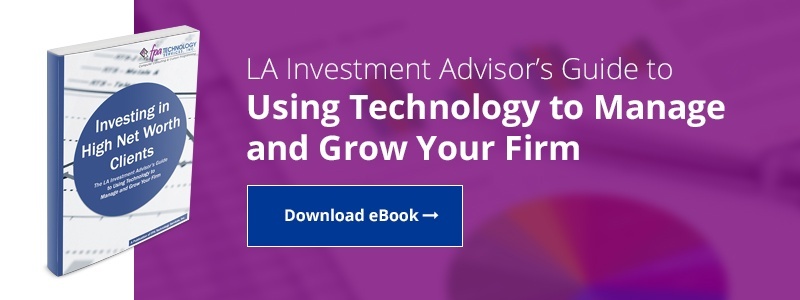 As a Los Angeles based Registered Investment Advisor, there’s a good chance you spend the majority of your time guiding clients into making the right decisions and monitoring markets so that you’re always one step ahead of the competition. And one of the ways to stay ahead of the competition is to leverage your technology as best you can.
As a Los Angeles based Registered Investment Advisor, there’s a good chance you spend the majority of your time guiding clients into making the right decisions and monitoring markets so that you’re always one step ahead of the competition. And one of the ways to stay ahead of the competition is to leverage your technology as best you can.
I’m thinking you’d have to be living under a rock NOT to have heard about the cloud. Having said that, have you been thinking about moving to the cloud with your computer system? If so, here are five things that you should think about first:
1. Understand the needs of your business and how the cloud can best fulfill them
Moving your computer system to the cloud may well be one of the most impactful business decision you ever make. After all, what could be more beneficial than having your systems and information ready for access and analysis at the push of a button, regardless of where you are? In order to make the most of your move to the cloud, though, it’s essential to think about your business and the kind of service you’re expecting. What are your current business standards, and how could the cloud help you to maintain such consistency? It’s important to choose the right cloud vendor for yourself, your business, and your clients. Rash decisions can be costly.
While for the most part the cloud is seen as reliable and secure, there are concerns around the “what ifs?” Having your most business critical information dependent on factors outside of your control can be trying. What can your business withstand if you can’t get to systems for a specific time frame? What is that time frame? What have you done to reduce the probability of the failure points that you can control? These are all questions you should run by your IT staff during the evaluation process.
2. Security and licensing
There are a number of licensing and security considerations that you’ll need to make before switching to a cloud-based infrastructure, including researching how particular cloud systems are maintained and secured, whether data can be kept entirely safe, and the type of agreement you’d be expected to sign before making the switch.
Do you know where your data will be located? Is it onshore here in the US or will it be located oversees? The answer to this may have specific impacts on your business from a compliance standpoint.
Are you in possession of any data or documents that wouldn’t be licensed for use within a cloud system? If such questions are making you more confused, it’s time to dig a little deeper.
3. Backup and disaster recovery
What are your current disaster recovery policies, and how could these be supported in the cloud? Your backup procedures will change if you move to the cloud. And so will your business continuity planning.
Any RIA should think about their desired backup speed, their recovery time objective, and the cost of creating such a recovery process. You need to outline an efficient and effective process, not one that would prove detrimental to your recovery efforts.
4. The migration process
One thing many business owners like the fact that a cloud infrastructure is not yours to maintain; it simply hosts your data allowing you to access files from anywhere in the world. You will need to consider how your information as it currently resides will get to the cloud. You will also need to determine what needs to be migrated. These considerations are all based on what systems you’ve decided to host. Everything technology related in your business should be driven by the applications you’re running (not from the hardware perspective). So, what systems do you want to move to the cloud? The data then follows.
Another questions to ask yourself is what are the roles of everyone involved? Do you have people on staff who have the technical expertise to make the transition smooth and look out for your firm’s best interest? Don’t just take your cloud vendor’s word. Who (on your team) will be responsible for the move and then who will be responsible for what to support things?
From an ongoing support perspective, you will also need to consider your current IT management structure and question what will happen when issues occur. How would these be figured out and by whom? Your answer to these questions could determine how smoothly your migration process would be as well as expose potential down the road complications.
5. Scalability
During the early days of your career you will have created a business plan, along with a set of goals for the future. Now that you’ve had a chance to settle into life as a Registered Investment Advisor, how have those goals changed, and how could a move to the cloud support or hinder those dreams? It’s essential to make sure any changes to the way your business is operated are scalable – that is, that they will grow with you and encourage development.
While the cloud was perhaps designed with growth in mind, you can never be too careful that you and your new system will be on the same page. As they always say, proper planning prevents poor performance. And scalability is a factor in being able to handle future growth.
Are you an Investment Advisor looking to move to the cloud? Let us know your thoughts or struggles in the Comments box below.
And to follow-through on the tips introduced here, be sure to download your free guide, Investing in High Net Worth Clients: The LA Investment Advisor's Guide to Using Technology to Manage and Grow Your Firm.
/fpa-logo-tagline.gif)






